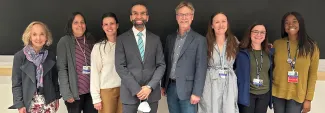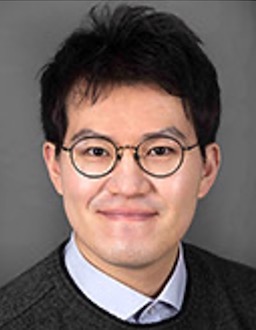The Manton Center for Orphan Disease Research at Boston Children's Hospital was created to develop new methods for understanding, diagnosing, and treating rare genetic conditions and to apply this knowledge to make fundamental scientific advances with broad implications for human health.
Manton Center News
The Manton Center enjoyed the opportunity to host Fowzan Alkuraya, MD for our monthly rare disease seminar. Dr. Alkuraya has published hundreds of scientific articles related to novel gene discoveries and rare disease research. He is a Professor of Human Genetics at Alfaisal University and Chairman of the Department of Translational Genomics at King Faisal Specialist Hospital and Research Center in Riyadh, Saudi Arabia.

 We are excited to share that Manton Center Fellow, Hyunyong Koh, MD, PhD, published a new article discussing the importance of exome sequencing in children with unexplained epilepsy. Read more about his study and findings.
We are excited to share that Manton Center Fellow, Hyunyong Koh, MD, PhD, published a new article discussing the importance of exome sequencing in children with unexplained epilepsy. Read more about his study and findings.
The Manton Center staff also has several new manuscripts recently published!
- A framework for individualized splice-switching oligonucleotide therapy
- Jansen-de Vries syndrome: Expansion of the PPM1D clinical and phenotypic spectrum in 34 families
- An intronic variant in TBX4 in a single family with variable and severe pulmonary manifestations
- Children with Early-Onset Psychosis Have Increased Burden of Rare GRIN2A Variants
- High number of candidate gene variants are identified as disease-causing in a period of 4 years
Check out our News and News Archive pages for more great stories!
About The Manton Center
Founded in 2008, the Manton Center was one of the first centers in the world solely devoted to the study of rare diseases. The Manton Center hopes to increase scientific knowledge about rare diseases through supporting patient-focused research, building collaborations within the rare disease community, and funding existing research efforts focused on rare diseases. Through the various research projects, funding and awards, and outreach efforts, The Manton Center facilitates the discovery and development of more effective diagnostic pathways and therapies for rare or unknown conditions.

Boston Children's Hospital joined in a partnership with The Manton Foundation to create a center devoted to understanding "orphan diseases" - genetic syndromes, immune system problems, errors of metabolism, neuromuscular disorders and other little-noticed but scientifically important disease processes. In our center, experts committed to answering critical questions posed by puzzling and difficult diseases can collaborate, multiplying the impact of key medical discoveries and helping children and families facing profound medical challenges.
A rare, or “orphan” disease is defined as a disease or disorder that affects less than 200,000 people in the United States at any given time. However, the word rare seems somewhat unfitting when we realize that 30 million people in the U.S. are affected by a rare disease. While many people live with these rare or unknown conditions, a lack of scientific knowledge about their underlying causes can often lead patients through a journey complicated by misdiagnosis, poor treatment options, and lack of funding for research and advocacy.
The Manton Center Goals
The Manton Center is a virtual center for clinicians and scientists at Boston Children's Hospital who share a common vision of helping families by improving our understanding and awareness for rare diseases. The goals of this collaboration are to:
- Unlock the mysteries of orphan diseases in order to develop better diagnostic tests and design new treatments and cures.
- Discover fundamental biological principles that have broad applications and can lead to advances in our understanding of common diseases such as cancer, heart disease, diabetes, and other major health problems.
- Train a new generation of investigators who will infuse creative energy into the battle against orphan diseases.
- Disseminate The Manton Center's findings among lay and medical/scientific communities locally, nationally, and globally to enhance interest and support for orphan disease research and care.
